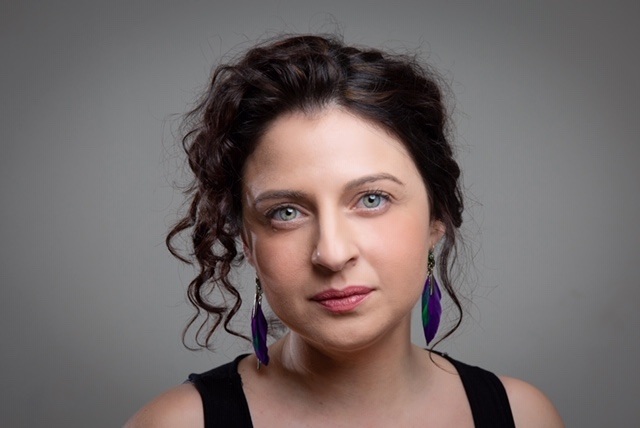A story of resilience and love
The best-selling novel, The Beekeeper of Aleppo, was born out of Ms. Christy Lefteri's volunteering experience at Faros' Family Center in downtown Athens. It is a powerful story of love and resilience. It is also "a doorway", Ms. Lefteri says, into the lives of refugees around the world who struggle to find safety.
In the summer of 2016, Ms. Christy Lefteri, the daughter of Cypriot refugees to the United Kingdom, visited her father in Cyprus. After many decades in the UK, he had returned home. His hometown, located at the very far east side of the small Mediterranean island, was facing Syria. She remembers sitting on the beach thinking "I am safe, but just across the water, there is a horrible war going on."
In a heartbeat, Ms. Lefteri decided to spend the rest of her summer as a humanitarian volunteer in Greece.
She volunteered at Faros' Family Center at Victoria Square, preparing the tea and helping refugee mothers and their children. During her shifts, she sat down and talked with several of them.
Faros chatted with Ms. Lefteri through a video call earlier this spring. Her experiences in Athens, she says, became the broad strokes of The Beekeeper of Aleppo. This is her story about the writing of the book.
The characters
"When I came back to London I couldn't stop thinking about these people," Ms. Lefteri says. "I started getting this picture of a husband and wife who lost their little boy in Syria. I kept thinking about all the children that hadn't made it to Europe. This haunted me," she adds.
Her characters are not based on real people but are a mosaic of different people she met. Nuri, the beekeeper, and Afra, his wife, were living a simple life in the Syrian city of Aleppo but they lost everything because of the war. "I had this picture in my head. In my mind the woman was blind and she had lost her son and the man was trying to make her smile," she says. They embark on a dangerous journey through Turkey and Greece towards the UK. While they have to overcome the dangers on the way, they delve deeper into their relationship as husband and wife.
The main characters are also inspired by Ms. Lefteri's parents. "They lost their homes, their friends, everything they knew. Suddenly, they were in London having to start a new life. My dad fought during the war and he was quite traumatized. (...) I tried to bring that into the story."
The research
In 2017, Ms. Lefteri came back to Athens. Faros' Family Center was not operating in an emergency mode anymore. It was bustling with refugee children and women, who were attending English and Greek language classes and other recreational activities. "I thought that I am so glad to be back to see the strength of the human spirit. Not just the people who risked their lives to come to Greece, but also the volunteers and those who were running the Center," she says.
She started teaching English at the Center. When she was not in class, she was writing. She wrote "the Athens part" of her book sitting at the same spot, at the same cafe. Locals and refugees were approaching her and were sharing their stories. "I was completely engrossed in it. I learned so much and I remember thinking I am not leaving Athens until I write the whole Athens bit,” she says.
Upon her return to the UK, Ms. Lefteri kept researching about Syria and her characters. She met several refugees who guided her in her story. For example, she developed Nuri's character after meeting Dr. Ryad Alsous, his family, and his bees. Dr. Alsous, a former Professor at Damascus University, arrived in the UK as a refugee and settled in Huddersfield, a city at the West Yorkshire. Back in Syria, he was managing hundreds of beehives and was producing tons of honey a year. In the UK, he created the Buzz Project, where refugees and vulnerable young people are working together to manage 20 beehives, producing royal jelly, honey, and beeswax. Her Arabic tutor, Ibrahim, also helped her bring Syria's seasons, smells, and landscape to life.
The power of storytelling
Ms. Lefteri, a former phychotherapist, believes that literature helps us empathize more with people. A good novel is "a doorway" into the lives of others, she says. In the media, she adds, the language used about refugees is not specific. "There is a lot of trauma imagery and the viewers don't get the individual stories. Instead, they get a lot of statistics."
While doing research Ms. Lefteri came upon a study from Professor of Psychology, Paul Slovic. "There was a beautiful quote that stayed in my mind, which was 'statistics are humans with their tears dried off.' I always remember that because I think that's so important. So, I think what storytelling gives us, whether it's a work of fiction, like mine, or a memoir or a documentary, is an intimate connection with either the fictional character or in a memoir the person who's been through it or in a documentary we get visual, we can follow somebody's journey in a different way," she says. "So I think for me what is really important about this kind of storytelling is the intimacy that we get and it is through that intimacy that we can feel more empathy."
Love is what remains
The Beekeeper of Aleppo spent 7 weeks in the Sunday Times top 10, peaking at number 4 and has sold over 100,000 copies. It also won the third annual Aspen Words Literary Prize which awards $35,000 for illuminating a "vital contemporary issue" in fiction. Translation rights have been sold to 45 countries including the U.S., Canada, France, Germany, Italy, and Greece, and there are discussions about adapting it for the big screen. When we ask Ms. Lefteri about the popularity of her book she says that its core message resonates with so many people.
"The point of the novel isn't whether Nuri and Afra make it to physical safety. We know that they eventually make it in the UK because that's how the story begins and the rest is told in fast-backs," she says. "Nuri is suffering from severe post-traumatic stress. His wife is blinded by the bomb that killed their son. They have forgotten how to love each other. So the real question is the internal journey these two people have to make in order to learn to live again after losing their son."
She pauses and she adds: "These are the things we all can relate to. There will be refugees from all over the world and all periods in history. I was not a refugee. My parents were. But when I went to Faros I kept thinking about my parents, my aunts, my uncles and grandparents. There is one thing we all have in common: we suffer from trauma. And then, how can we care and love the people in our lives?"

